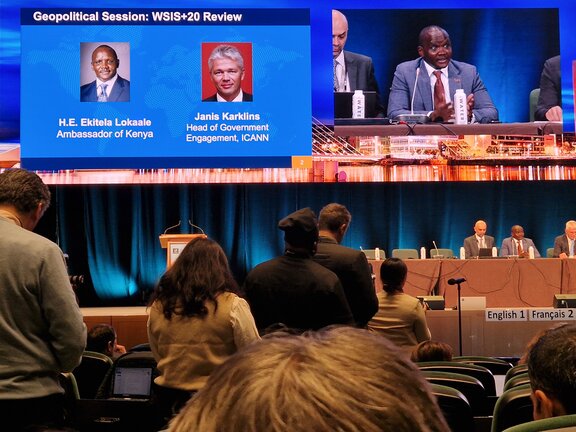The ICANN community will meet in Dublin, Ireland, from 25 to 30 October to hold its annual general meeting. The conference will focus on the further development of policies and processes by the ICANN community. In addition to the latest developments in reviewing the implementation of the outcomes of the World Summit on the Information Society 20 years ago (WSIS+20 review), the following developments are relevant from a children's rights perspective: the further development of a Human Rights Impact Assessment, the removal of the time limit on the Registration Data Request Service (RDRS) and the processing of urgent requests in this context. All topics are examined from the different perspectives of the community. Representatives from the areas of technology, commerce, government and civil society come together to share their expertise and jointly develop good solutions for a stable, secure and unified global internet. In this spirit, Chairwoman Tripti Sinha compared the Irish term Meitheal to the collaborative work of ICANN's multistakeholder community in her opening speech at the event. Meitheal describes a cooperative way. of working in Ireland where people support each other, for example in bringing in the harvest.
One focus on 27 October was the discussion on the status of the ongoing review of the implementation of the outcomes of the World Summit on the Information Society 20 years ago. Against this backdrop, Ekitela Lokaale, co-facilitator responsible for the UN process, was invited to present his views and provide information on the current status of the process. In addition, there was an opportunity to provide direct feedback, suggestions and comments on the draft report of the co-facilitators. The Kenyan Ambassador to the United Nations described the ongoing review process as ‘an opportunity for a renewed commitment to a shared digital future.’ This should be inclusive, respectful of human rights and human-centred.
In his oral contribution, Torsten Krause addressed this issue and emphasised his support for the human rights orientation of the draft text. At the same time, he pointed out that the United Nations adopted the Convention on the Rights of the Child in 1989 in order to guarantee the rights of children as a particularly vulnerable group. In addition, in General Comment No. 25, the Committee on the Rights of the Child explained in 2021 how children's rights should be realised in the digital environment. It would be important to take this into account in the document. He also made two additional suggestions. Paragraph 46 should be expanded to emphasise that the rights to protection, provision and participation are equally relevant and cannot be prioritised against each other. With regard to paragraph 59, it was suggested that children should be able to contribute their perspectives directly to processes of internet governance. Alternatively, this could be done by children's rights representatives.
The points presented orally were also submitted in writing for the process and can be read here.

